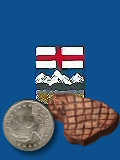|
2005 - Articles by Margret Kopala
2005 was hard on Canada’s institutional foundations
It’s one thing for politicians to bribe voters with their own money but it’s another thing for them to play fast and loose with the country’s social and political institutions. As 2005 closes, what lingers is not Belinda Stronach’s defection, though this was a substantial blow to the body politic. Rather it is the continued erosion of the body’s institutional foundations... (more) |
December 31, 2005

|
|
Political Parties Paradoxical
Whither goest Canada’s political parties, so goest Canada and, judging by the Christmas season’s policy-wonk stocking-stuffers that tackle just this subject, these are challenging but not insurmountable times for both. Even as that old Liberal warhorse chronicler, Stephen Clarkson, concedes the reduction of Canada’s natural governing party to an Ontario rump, the newest kids on the political block, Tasha Kheiriddin and Adam Daifallah call for yet another conservative revolution. Meanwhile Lethbridge Community College political scientist Faron Ellis examines the last such revolution in the form of a timely historiography of the Reform Party. ... (more) |
December 17, 2005

|
|
How federal Tories betray the West
The West's highest hope and biggest fear in this federal election is that the Conservative party will win. A Conservative win could bring meaningful reform to federal institutions and offices and address western concerns about trade and the economy. On the other hand, it could mean yet another chapter in the cycle of betrayal of the West by a conservative party. A superficial glance suggests the West would be fully included in a Conservative government that would then address western issues. But the danger is it would be deja vu all over again, says Faron Ellis, a political scientist at the University of Lethbridge. "Diefenbaker, Clark, Mulroney ... our team gets in, the West gets its due, then it doesn't address western issues." ... (more) |
December 3, 2005

|
|
A Reserve that Works
Should next week's first ministers' meeting with aboriginal leaders take place as planned, Prime Minister Paul Martin's vaunted "transformational change" will be high on the agenda, but the growing phenomenon of urban reserves suggests such change is already underway in Saskatchewan. Soon, Winnipeg Mayor Sam Katz and several Manitoba chiefs will visit Saskatoon to find out how it is done. And, spurred by Kashechewan and a pressing land claim in the Toronto area, a letter from Ontario Premier Dalton McGuinty requesting more information about urban reserves recently landed in the mailbox of the Federation of Saskatchewan Indian Nations (FSIN). "Urban reserves are vehicles of economic opportunity," says the federation's third vice-chief, Delbert Wapass, whose portfolio assignments include urban affairs. Today, he says, 45,000 of Saskatchewan's 90,000 aboriginal people live off reserve. "Urban reserves are situating to become part of both aboriginal and mainstream worlds, serving consumers and employing people in both"... (more) |
November 19, 2005

|
|
How to Get Rid of Liberals
Prior to Justice Gomery’s report, Canada’s lone unity warrior cautioned against seeing threats to national unity at every turn. Environment Minister Stephane Dion’s sentiments are well taken but the generation that grew up in the shadow of the Bomb may be forgiven for having an overdeveloped sense of impending catastrophe – despite the relative safety of our 1950s Edmonton homes. We can hope that Gomery Parts 1 and 2 will bury the sponsorship scandal but, for us, the larger question remains whether Canada will go down with it... (more) |
November 5, 2005

|
|
Forum Shopping for Settling Trade Disputes Must End
After ongoing but usually unsuccessful challenges by U.S. interests against (mostly western) Canadian softwood lumber, wheat and cattle interests, Canada-U.S. trade disputes and grievances are shifting from the panels and tribunals of the NAFTA, the WTO, the ITC and the U.S. Department of Commerce to the U.S. and D.C. Circuit Courts of Appeal, and the U.S. Court of International Trade, to name three. First it was Canadian cattlemen who sued for damages incurred by the U.S. border closure and now the Canadian government, the Wheat Board and softwood lumber interests, among others, are challenging America’s infamous Byrd Amendment... (more) |
October 22, 2005

|
|
Canada Needs Fewer, Not More, Immigrants
Traveling the Trans-Canada Highway heading west, you soon get the economic measure of a place by whether it is a one-Tim or a two-Tim town. When you reach a mega-Tim town, you know Canada’s coffee-and-doughnut culture has achieved its apotheosis. It’s hardly surprising that the city that spawned some of Canada’s greatest hockey would also boast a large Tim Hortons prominently situated in its downtown core. These are boom times, after all. Canada’s Gateway to the Tar Sands has succumbed to urban sprawl and everything that goes with it – the need for more infrastructure, services, skilled labour and places where workers can, in the time- honoured tradition, grab a quick repast. “Over the next five years, Alberta will need 400,000 skilled workers,” says Edmonton Mayor Stephen Mandel. “We can find 300,000 of those internally but that leaves a shortfall of 100,000.” ... (more) |
October 8, 2005

|
|
It’s Well Past Time for an Air India Inquiry
Kim Bolan believes the Air-India disaster needs a public inquiry and she should know. In 1984, as a self-described rookie, the Vancouver Sun reporter covered Sikh community demonstrations in B.C.’s Lower Mainland protesting the Indian government’s attack on their Golden Temple in Amritsar - the home of Sikhism located in the northern Punjab state of northwestern India. A year later, Canada awakened to the news of the Air-India disaster. The 329 passengers, mostly Canadians of Indian origin, perished when a bomb constructed in British Columbia exploded in the luggage compartment of Flight 182 just past the coast of Ireland. Half way around the world, within the same hour, another bomb exploded at Tokyo’s Narita airport, killing 2 and injuring 4 others. It was mass murder on a scale unprecedented in Canadian history... (more) |
September 24, 2005

|
|
Many in the West don't Benefit from Free Trade
Three kilometers from the north end of Beverley McLachlin Drive, looking past the Red Roof Café, you can see a train station and grain elevators. To the southeast there’s Highway No.3 dipping and winding its way past a feedlot and, eventually, a few oil rigs. To the west, past fields of energy-generating windmills and bales of hay, the forested Rocky Mountains loom... (more) |
September 10, 2005

|
|
Second Thoughts About Marijuana
Vancouver Sun columnist Ian Mulgrew recently bemoaned Justice Minister Irwin Cotler's failure to speak up on behalf of Marc Emery, British Columbia's "Prince of Pot" and self-described benefactor-cum-martyr to the cause of marijuana legalization. Mr. Emery is facing charges in the U.S. for alleged money laundering and marijuana-related conspiracies. Worse, during a press conference, it appeared the minister was disavowing Bill C17, which will see tickets issued for simple possession of marijuana... (more) |
August 27, 2005

|
|
Support for Western Separation is Growing
In yet another bribe-and-conquer attempt to undercut Quebec separatism and bolster its own faded electoral fortunes, the Liberal government is hoping to attract Quebec’s “ethnic” - if not exactly its “money” - vote by appointing Radio Canada host Michaëlle Jean as the governor general designate. Like much else in the Liberal political lexicon, this appointment is proving more divisive than cohesive... (more) |
August 13, 2005

|
|
The Victims of Marriage Reforms
Apart from sporadic references to polygamy, debate about the potential social effects of same-sex marriage has been ignored. But according to Douglas Allen, a family economist at Simon Fraser University, the law of unintended consequences must inevitably apply. In a submission to the suspended Justice Committee on Same Sex Marriage, Allen argues the outcomes of past family reforms, such as no-fault divorce, were completely unanticipated by those who advocated change. Moreover, those outcomes were largely negative: divorce rates increased to today's high of almost 40 per cent, as did the rate at which women entered the workforce and the incidence of spousal abuse. Poverty was feminized and the age at which people marry rose while the value of marriage in the popular culture fell... (more) |
July 30, 2005

|
|
Understanding the Biology of Homosexuality
When the House of Commons redefined marriage to include homosexual unions, Prime Minister Paul Martin declared an end to the debate while in Alberta, Premier Ralph Klein mused about leaving the marriage field altogether. Since provinces have jurisdiction over solemnizing marriage, Mr. Klein's government could have authorized civil unions for all couples, leaving churches free to perform marriages as they see fit... (more) |
July 16, 2005

|
|
Something Beautiful for Our Harsh Climate
It is a truism that Canada’s national character is rooted in the relationship between the people and the land. From crossing the Northwest Passage to driving the last spike to surviving both in fact and fiction, Canada’s history of blood, sweat and tears spilled on the crucible of geography has been widely celebrated... (more) |
July 2, 2005

|
|
Harper Should Skip the Barbecues and Read Policy Instead
“Acquiring power, and keeping it, is all about winning the argument.”
Tim Potier, “British Conservatism: Where Next?”
In the National Interest, May 2005
In a misconceived and defensive show of rallying round the leader to help him with his so-called image problem, Conservative caucus members are sending Stephen Harper on the summer barbeque circuit while they announce party policy goodies. Never mind both will be lost in the summer smog, what a waste of a leader arguably the best versed in Canada’s political, social and economic realities for several decades. More than that, Mr.Harper is a leader who shoulders the burden of the aspirations of the West, not to mention, increasingly, the future existence of Canada – a blunt reminder of which erupted recently in a seminal essay urging Alberta and Quebec to get on with it, to do the deed because the country is finished anyway... (more) |
June 18, 2005

|
|
Seeking Honour Beyond Parliament
The damage done by the sponsorship scandal and recent events surrounding parliamentary defections can't be minimized. Calculated acts for personal gain betray the public trust and undermine the system. We can be encouraged, however, that while certain of Parliament's honourable members were behaving dishonourably in Ottawa, honour's institutional and democratic incarnations, the British monarchy and British Columbia's Citizens' Assembly were hard at work in Western Canada.... (more) |
June 4, 2005

|
|
Next Government Cannot Ignore the West
In the coming final days of May, a great deal of history and politics will converge in the western Canadian landscape. Centennial celebrations in Alberta and Saskatchewan are well under way and will soon highlight a visit by Queen Elizabeth and Prince Philip. Then there’s the impending federal election. Perspective and insight are therefore in order, both of which are supplied in abundance by an essay in the May edition of the Literary Review of Canada. With timely if unsettling observations about relations between Alberta and the rest of Canada, “The Rich Kid – Where does Alberta fit in the Canadian family now?” argues the western Canadian strategy of national inclusion, “the West wants in,” is in tatters... (more) |
May 14, 2005

|
|
The Manning-Harris, Ignatieff papers
The Liberal party death throes are painful to behold bringing, as they do, so much shame and anger upon the land. The Gomery gnashings ensure a protracted demise, something an early or even later election call is unlikely to hasten. After all, an election could produce another minority government then, soon after, another election. When will it end? How will it end? Mercifully, two important documents have emerged to suggest ways in which the beleaguered Canadian phoenix may pick itself up, dust itself off and, if not rise from the ashes, at least start all over again... (more) |
April 23, 2005

|
|
John Paul's Final Journey Home
Karol Wojtyla’s mother died in 1928. The boy who was born in a small town near Krakow was only eight years old. By age twenty two, the whole of his immediate family had passed on, including his beloved father. With his fine mind and deep religious faith, he entered the priesthood where he reached the heights of which we were again reminded this week. Perhaps it gave him solace, too, in the face of so great a personal loss... (more) |
April 9, 2005

|
|
Boosting Security with the U.S. is Good for Canada
Prime Minister Paul Martin downplayed suggestions the Security and Prosperity Partnership agreement signed in Waco, Texas this week will lead to European style continental integration but if nothing else it is a major step towards more continental bureaucracy. Any agreement that covers a slew of security, economic, regulatory and environmental initiatives replete with reporting mechanisms across North America is laying the foundation for something... (more) |
March 26, 2005

|
|
Marijuana is Dangerous, Now and in the Future
RCMP Commissioner Giuliano Zaccardelli retracted his statement that the Mayerthorpe tragedy was about marijuana but the sad reality is he may have been right the first time. Caution is necessary before interpreting behaviours described in the media, but reports about James Roszko, 46, suggest pathologies consistent with psychosis – a condition which scientific studies increasingly connect to early use of marijuana... (more) |
March 12, 2005

|
|
An Oily Road Ahead For Our Men in Washington
France and Russia were deeply involved with Saddam Hussein because of it. China and India give the term “state-trading-enterprise” new meaning as they sniff the planet’s surface for sources of it. Here in Canada, Newfoundland and Labrador lowered the Canadian flag over it while Saskatchewan will takes its case for it to Canada’s Independent Equalisation Panel. In the increasingly pipeline be-ribboned Alberta, you’ll find the planet’s second largest reserves of it. Everywhere, the question is who wants it, who’s getting it and who’s got it... (more) |
February 26, 2005

|
|
Don’t Drink Mother’s Milk From a Poisoned Chalice
And so it has come to this. One former and one current prime minister hauled before a judicial inquiry to tell their sorry, hollow tales. It could have been worse. The other former prime minister, Brian Mulroney, could have been there too, rubbing the collective Canadian nose in the stench of an Old Canada political culture that dates back to Sir John A. Macdonald. The sponsorship scandal reduced Paul Martin’s government to minority status but now the Gomery inquiry ensures that, like a ball and chain, it will hobble Martin for the rest of his political days... (more) |
February 12, 2005

|
|
Bountiful is a Detour on the Road to Same Sex Marriage
If Paul Martin wants to tinker with definitions of marriage he may wish to consult with the ghosts of politicians past, starting with his own father. Along with John Diefenbaker and Davie Fulton, Paul Martin Senior was an architect of the trailblazing Canadian Bill of Rights that acknowledges the position of the family and affirms “that men and institutions remain free only when freedom is founded upon respect for moral and spiritual values and the rule of law.” “Diefenbaker, Martin Senior and Fulton agreed that human rights needed a religious foundation,” says George Egerton, a University of British Columbia historian specializing in religion, politics and human rights. “In fact, Paul Martin Senior felt the traditional family needed constitutional protection.” ... (more) |
January 29, 2005

|
|
Duceppe Makes His Pitch to Western Francophones
Gilles Duceppe went West last week and found an audience still opposed to Quebec sovereignty but more receptive to him as person and a politician. Reassuring western francophones of his party’s continuing support, he also offered a fiscal position that made sense to anglophones. “People in Saskatchewan are opposed to Quebec sovereignty but now they know and respect Gilles Duceppe better,” says Frederic Dupre, research co-ordinator at the University of Regina’s two year old Institute Francais, “so they are more open to him.” Dupre ferried the Bloc Quebecois leader to last Tuesday’s meetings at a francophone school, Ecole Monseigneur de Laval, before he appeared as a guest of the L’Assemblee communautaire fransaskoise and later addressed Regina’s business and academic communities. “He defends social and democratic values and is more respectful and calm, not passionate, but more rational. The kind of politician people could vote for,” says Dupre... (more) |
January 17, 2005

|
|
An Ill Wind for the NCC Blows Through 24 Sussex
Not since Aristophane’s Lysistrata persuaded the women of Athens to withhold conjugal rights from husbands refusing to make peace with Sparta has a political wife effected so shrewd a move. Opening the doors of 24 Sussex Drive for charity, Sheila Martin revealed the drafty corridors, threadbare carpets and otherwise generally dilapidated condition of one of Canada’s premier heritage properties. The women of Ottawa came and tsk, tsked, as well they might. So resounding was their message, it was heard all the way to the Northwest Territories... (more) |
January 2, 2005

|
|
|